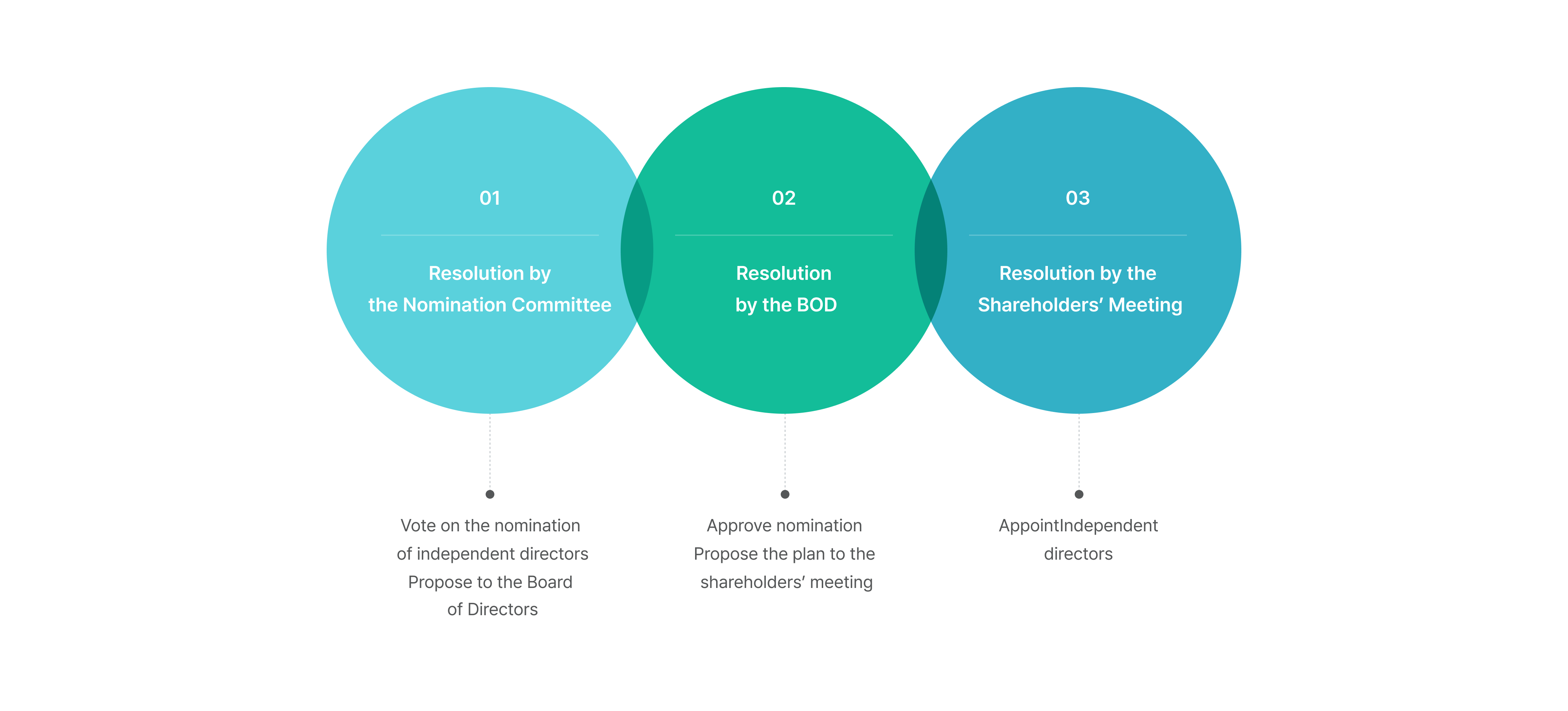LG Energy Solution builds a circular battery ecosystem in line with
carbon neutrality and drives sustainable growth across diverse industries.
Board of Directors
LG Energy Solution has formed its Board of Directors with members who possess expertise across diverse fields to support sound decision-making. The company appoints a majority of its directors as independent directors and has established and advanced systems to ensure their independence.
Board Composition

Kwon, Bong Seok Chairman/Non-standing Director
Mar, 2022~ Mar, 2028
- Vice Chairman, COO of LG Corp
- Former President, CEO of LG Electronics

Kim, Dong Myung Director
Mar, 2024~ Mar, 2027
-
Executive President,
CEO of LG Energy Solution -
Former Advanced Automotive Battery Division
Leader of LG Energy Solution

Lee, Chang Sil Director
Dec, 2020~ Mar, 2028
-
Executive Vice President, CFO of LG
Energy Solution -
Former Senior Vice President,
Business Management Department of LG Chem

Shinn, Mee Nam Independent Director
Jun, 2021 ~Mar, 2026
- Former CEO of Auction
-
Former President,
Doosan Fuel Cell Business Unit

Yeo, Mee Sook Independent Director
Jun, 2021 ~ Mar, 2027
-
Professor,
Hanyang University School of Law -
Former Presiding Judge, Seoul High
Court/Seoul Central District Court

Han, Seung Soo Independent Director
Jun, 2021 ~ Mar, 2027
-
Professor,
Korea University Business School -
Vice Chairman, Korean
Association for Accounting and Policy

Park, Jin Kyu Independent Director
Mar, 2023~ Mar, 2026
-
Specially appointed professor,
University Research Institute Industry
Collaboration Center, Korea University -
Former 1st Vice Minister,
Ministry of Trade, Industry & Energy
Guidelines on Independent Directors' Independence and Expertise &
Diversity of the Board of Directors
LG Energy Solution’s Board of Directors constitutes more than majority of Independent directors in order to ensure the transparency and effectiveness of its governance structure and their reappointments are determined based on the evaluation of their activities and performance. In line with ‘Guidelines on the Expertise and Diversity of the Board of Directors’ and ‘Guidelines on Independent Directors’ Independence’, we strive to ensure that the Board consists of expert directors holding a diversity of experiences and perspectives to facilitate reasonably prudent decision-making process. We will continue to strengthen the independence, expertise and diversity of the Board and reinforce the sustainable governance system.
Appointment Process of Independent Directors

Corporate Governance Charter
LG Energy Solution established Corporate Governance Charter alongside Articles of Incorporation, which defines the company’s objectives and outlines the rules for its operations, in the belief that governance integrity promotes transparent and responsible business activities, which serve as a foundation to fulfilling social responsibility and creating sustainable values of the company.
Based on this Corporate Governance Charter, LG Energy Solution protects the rights of shareholders and treats them fairly; establishes the transparency and accountability of the business through the Board of Directors and the Audit Bodies, which are structured and operated in an independent and experts manner; and strives to be a socially responsible company that respects the rights of various stakeholders.
Catalog Download
Consent to Collection and
Use of Personal Information
LG Energy Solution collects and uses personal information as follows for the purpose of providing downloads and responding to inquiries.
-
Items Collected
Name, Email, Company Name
-
Purpose of Use
Consent to Receive Marketing Information
-
Method of Provision
Email
-
Retention & Use Period
Retained for one (1) year from the date of collection, then destroyed
-
Right to Refuse and Disadvantage
You may refuse to provide consent; however, in such cases, access to certain content may be restricted.
Consent to Receive
Marketing Information
LG Energy Solution uses personal information to provide useful information such as promotions and newsletters:
-
Items Collected
Name, Email, Company Name
-
Purpose of Use
Consent to Receive Marketing Information
-
Method of Provision
Email
-
Retention & Use Period
Retained for one (1) year from the date of collection, then destroyed
-
Right to Refuse and Disadvantage
You may refuse to consent; however, in such cases, content may not be provided.
Consent to Overseas
Transfer of Personal
Information
LG Energy Solution uses cloud systems to manage your information securely. Accordingly, your personal information may be transferred overseas.
-
Recipient
Microsoft
-
Country
United States
-
Items Transferred
Name, Email, Company Name
-
Purpose of Transfer
Data storage and system operation
-
Method of Transfer
Transmitted over network immediately upon collection
-
Retention & Use Period
Retained for one (1) year from the date of collection, then destroyed
-
Right to Refuse and Disadvantage
You may refuse to consent; however, in such cases, content may not be provided.

